Group Challenges for Students: Enhance Collaboration Skills
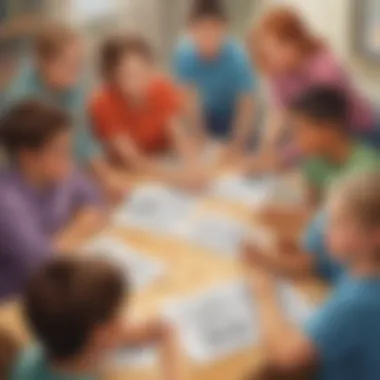
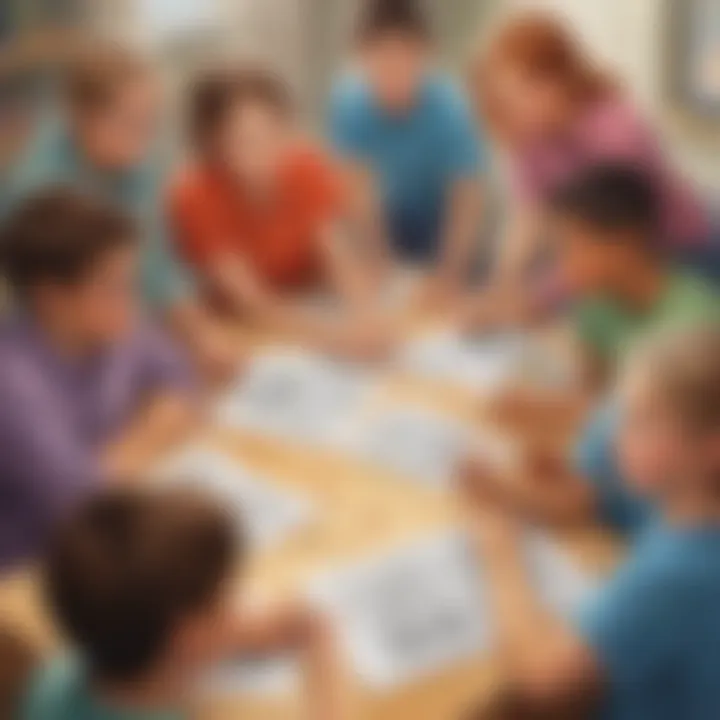
Intro
Fostering cooperation and critical thinking from a young age sets a strong groundwork for learners. Understanding effective group challenges can significantly enhance those skills in elementary students. This article will explore the design, implementation, and benefits of group challenges in the educational environment, guiding both educators and parents.
Creative Activities
Engaging children in creative activities promotes collaboration and critical thinking. These activities allow for self-expression, innovation, and teamwork among students.
Craft Ideas
Here are some craft ideas that children can easily replicate:
- Nature Collage: Collect leaves, flowers, and twigs to create unique collages.
- DIY Storybooks: Children can illustrate and write their own stories.
- Paper Mache: Using newspaper and glue, students can make artistic objects.
Step-by-Step Guides
For the nature collage activity:
- Go outside and gather varied natural materials.
- Arrange the materials on a piece of paper.
- Glue down the selected items.
- Allow to dry before displaying.
Educational Value
Creative crafting aids in developing fine motor skills and enhances imagination. These activities teach children about teamwork as they coordinate and share ideas. For example, while making a paper mache model, learners can discuss shapes and textures.
Fun Quizzes
Fun quizzes can offer engaging ways to reinforce learning. Their variety supports important subjects while maintaining student interest.
Quiz Topics
Some of the topics children can quiz themselves on include:
- Science experiments
- Famous historical figures
- Classic literature
Question Types
ElementFun hosts quizzes with different question types:
- True/False paired with scenarios.
- Multiple Choice for broader topics.
- Fill-in-the-Blanks focusing on key concepts.
Knowledge Reinforcement
Quizzes serve to reinforce what students are learning. They not only make education fun but encourage recall of essential information, thus deepening their understanding.
Fact-Based Articles
Fact-based articles present essential knowledge simply yet engagingly. Such resources can address various academic areas.
Topics
The articles cover diverse topics such as:
- The Solar System
- The Water Cycle
- Plant Life and Growth
Engaging Content
These articles make a potentially dry subject vivid and attractive. The writers present information clearly to hold student attention effectively.
Preface to Group Challenges
Group challenges facilitate distinct forms of learning experiences. Through collaboration and competition, students can develop important skills to navigate complex tasks in various settings. Understanding what group challenges are and their purpose sets the foundation for our discussion.
Definition and Purpose
Group challenges refer to collaborative tasks that require participants to work together toward a common goal. These challenges are meant to enhance participants’ interpersonal skills, critical thinking, and problem-solving abilities. Each group works through distinct phases, from preparation to completion, culminating in a holistic learning experience.
The primary purpose of implementing these challenges in educational contexts is to foster teamwork. Students learn to share ideas, listen to differing viewpoints, and deploy mixed strategies. In a nutshell, group challenges simulate real-world scenarios where individuals must collaborate and make decisions together.
Importance in Education
The significance of group challenges extends far beyond immediate classroom experiences. They allow students not only to engage in knowledge acquisition but also to apply concepts in dynamic environments. There are multiple reasons why group challenges are found to be invaluable in education:
- Skill Development: Practical experience helps students become proficient communicators and adept at critical thinking.
- Engagement: Group activities generate interest, keeping students involved in their learning process.
- Social Skills Improvement: Experiencing collaboration teaches empathy and responsibility, essential traits in personal and educationl growth.
Collaborative learning forms the cornerstone of modern educational philosophy.
Nodes of this movement have shown that students involved in group challenges tend to retain information longer and perform better academically overall. Moreover, though such challenges might appear straightforward, they cultivate a complex web of relationships. These interactions can drive stronger ties among students, fostering an inclusive educational environment.
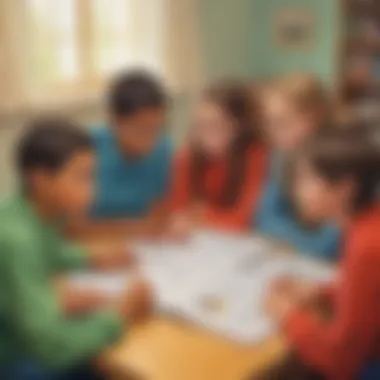
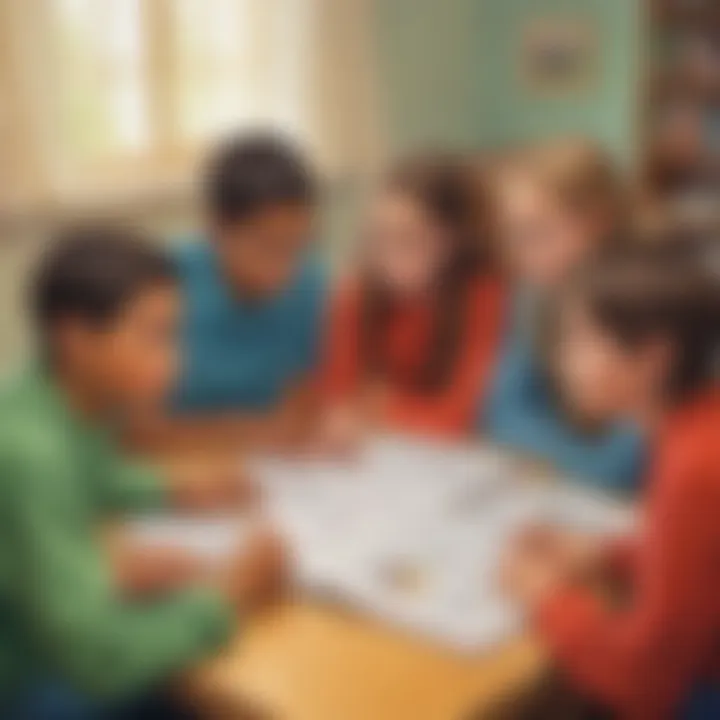
Thus, as educators and parents embrace the use of group challenges in school settings, the potential for brighter learning outcomes is apparrant. Gaining insight into how these tasks serve individual and collective growth is essential for unlocking their potential utility.
Types of Group Challenges
Understanding the Types of Group Challenges is crucial to fostering collaboration and critical thinking. Each type offers unique opportunities for students to engage with their peers, build skills, and apply knowledge in practical scenarios. The differentiation among these challenges helps educators tailor activities to specific learning outcomes and the various needs of students.
Creative Challenges
Creative challenges involve tasks that require students to use their imagination and originality. These exercises push students to think outside the box. Activities could include designing a poster, creating a story, or even producing a short video. These tasks enhance creativity by motivating students to share ideas and problem-solve together.working through feedback and collaboration teaches students to respect different opinions, refining their approach to creative tasks. Some ideas for creative challenges include:
- Art and design projects: Students work as teams to create a physical product.
- Story-making: Groups develop a plot together, teaching narrative structuring both verbally and in writing.
Engagement in creative challenges present opportunities for expression and behavioral development, which enhances classroom dynamics.
Problem-Solving Challenges
Combining elements of reasoning and collaboration, problem-solving challenges are designed to present specific dilemmas that need resolution. These challenges often require critical analysis of issues and can heighten cognitive flexibility. Students must strategize best approaches to resolve problems effectively. These activities could include:
- Mysteries or scavenger hunts: Searching for clues requires cooperative thinking.
- Case studies: Students analyze a scenario, brainstorm solutions, and defend their choice.
Each of these tasks encourages students to utilize their reasoning capability and enhances their ability to discuss multiple viewpoints, boosting group decision-making.
Physical Challenges
Physical challenges connect kinesthetic learning with team coordination. Through these activities, students improve interpersonal dynamics and increase motivation through movement. Scenarios may involve relay races, building structures with blocks, or outdoor team games. Importantly, they build mutual trust and promote leadership skills. Activities for physical challenges can involve:
- Obstacle courses: Encouraging strategic thinking and communication.
- Team sports: Promotes working seamlessly in roles where students succeed based on mutual efforts.
This blend of physical activity and cooperative spirit supports students’ social opportunities on multiple levels.
Technology-Based Challenges
As digital tools become essential, technology-based challenges allow students to leverage innovative platforms for enhanced meaning-making process. This takes traditional learning methodologies into new territory. These challenges can include:
- Collaborative digital storytelling: Using platforms like Google Slides or Microsoft PowerPoint.
- Coding projects: Working on software together teaches programming principles and teamwork simultaneously.
Certainly, engaging in technology-based projects develops digital literacy while reinforcing collaboration and enhances opportunities for learning through engaging interfaces.
The variety of group challenges facilitates prominent learning experiences and boosts cooperation. This foundation for collective efforts significantly prepares students for adaptive interactions in their education and fields in later stages.
Benefits of Group Challenges
Group challenges present educational opportunities to enhance the skills of elementary students. By participating in these activities, students not only learn academic concepts but also develop abilities that are important for their overall growth. In a world that values teamwork and critical thinking, fostering these skills through group challenges becomes essential. Here are some specific benefits of involving students in collaborative tasks.
Enhancing Social Skills
Group challenges require that students interact with each other actively. This engagement promotes effective communication. Children learn why listening is important. They begin to recognize non-verbal cues and the significance of empathy. In turn, they experience how to negotiate and resolve conflicts. Strong social skills are vital in later life, be it in personal or professional contexts. Being able to work with diverse peers helps create an inclusive atmosphere for further learning.
Developing Critical Thinking
Group challenges invite students to confront problems together. Solving complex issues in a team encourages them to think critically about possible strategies. Each student offers unique insights based on their perspective. Such collaborative thinking often leads to creative solutions that wouldn't surface in solitary efforts. Students enhance analytical abilities, asking the right questions, and cultivating a mindset geared toward solving challenges.
Promoting Teamwork
Through group challenges, students learn the essence of teamwork. They understand that together, they can achieve tasks more efficiently than separately. Working with assigned roles within a team allows students to see diverse strengths and how these can complement each other. Teamwork not only helps in completing the challenges but sets a foundation for future endeavors. Learning to depend on others and being dependable are critical skills that aid in many real-life situations.
Encouraging Risk-Taking
Participating in challenging group activities allows students to step outside their comfort zones. They may not always succeed on the first try, and that’s vital for growth. Embracing failure as part of learning does not only build resilience but also enhances self-confidence. Students learn to take calculated risks in a safe environment reinforced by their peers. Knowing others share the same experiences softens the fears they might hold regarding failure, enabling them to approach new concepts with an open mind.
"The ability to work in groups is not just a skill; it's a vital part of being successful in life." - Educational Insights
Implementing Group Challenges in the Classroom
Implementing group challenges in the classroom is crucial for nurturing essential skills among elementary school students. These activities provide various educational benefits, creating an environment where collaboration and critical thinking can thrive. When integrated correctly, group challenges motivate students to engage, exhibit creativity, and develop problem-solving techniques. This sets the foundation for their long-term personal and academic growth.
Setting Clear Objectives
Setting clear objectives is the first step when implementing group challenges. Educators must articulate the goals of each challenge, ensuring students understand what they are working towards. Clear objectives help students stay focused and allow them to assess their progress as they work together.
Here are a few points to consider:
- Clarity: Make sure objectives are communicated explicitly.
- Relevance: Objectives should be age-appropriate and engaging to stimulate student interest.
- Measurable Outcomes: Educators should identify criteria to measure success, making it easier to assess learning outcomes.
Forming Diverse Groups
Diverse groups enable a rich exchange of ideas and promote inclusive thinking. When forming groups, it is important to consider a variety of traits such as skills, backgrounds, and perspectives. This diversity can enhance the learning experience by encouraging students to approach problems differently.
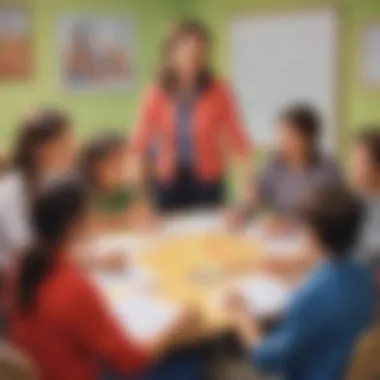
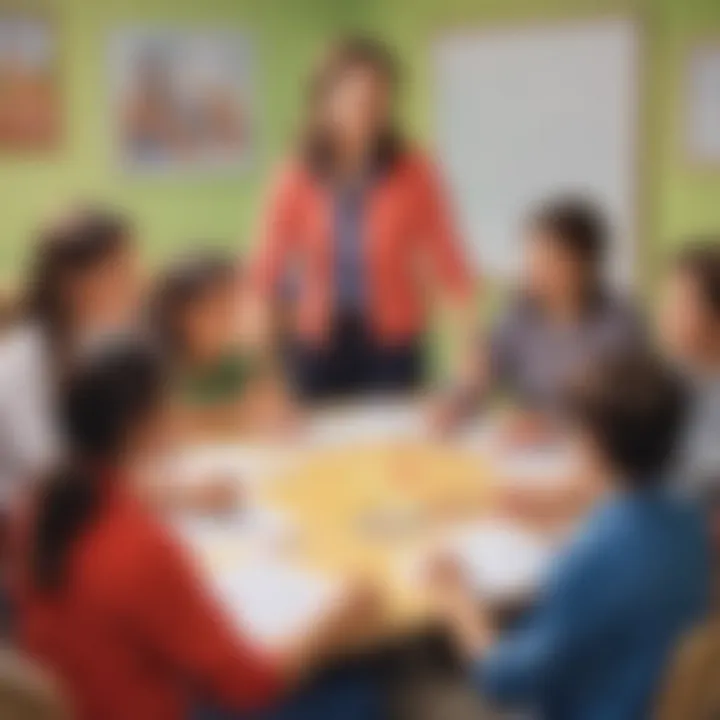
Consider these strategies:
- Mix Abilities: Group students with different skill levels to promote peer learning.
- Balance Personalities: Pay attention to group dynamics to minimize conflicts and foster collaboration.
- Blend Perspectives: Encourage an array of backgrounds for more enriching discussions.
Facilitating Discussions
Facilitating discussions during group challenges is key to ensuring productive collaboration. Educators should encourage students to articulate their thoughts and listen to each other respectfully. Doing so nurtures an environment rich in dialogue, helping students refine their critical thinking and collaboration skills.
Some facilitation techniques include:
- Encourage Different Viewpoints: Invite all group members to share their ideas, promoting inclusivity.
- Guide and Support: Provide gentle guidance when discussions become heated or unfocused.
- Encourage Reflection: After discussions, ask groups to recap their conclusions, reinforcing learning and comprehension.
Evaluating Group Performance
Evaluating group performance is an integral part of implementing group challenges. Even when a group achieves an objective, how they get there is equally essential. Educators should take a holistic approach to assessment, considering both individual contributions and group outcomes.
Here are some evaluation methods to incorporate:
- Observation: Monitor student interactions to gauge collaboration and engagement during challenges.
- Peer Reviews: Encourage students to critique each other’s contributions, fostering a sense of accountability.
- Reflection Essays: Have students write about their experiences, assessing their role and learning points gained from the challenge.
The focus on implementing group challenges in the classroom emphasizes the profound impact on not only academic development but also social skills that influence future collaborative efforts.
Challenges in Group Work
Group work can be an effective way to foster collaboration and critical skills among students. However, it also brings unique challenges that need to be understood and addressed. Recognizing these challenges can help educators design better group activities. By doing so, they can maximize learning outcomes for elementary students while minimizing difficulties that may arise.
Navigating Conflicts
Conflicts can occur in any group dynamic. Young students often struggle to express misunderstandings or disagreements. This can lead to frustration and even disengagement from challenges. Conflict resolution is a skill that must be taught, as students may not yet possess the language or techniques necessary to navigate these interactions.
Instructors can play a crucial role in guiding students through these conflicts. Establishing ground rules for respectful interactions can give students a framework. Educators may find it useful to introduce conflict resolution strategies during group collaboration. Examples include using I-statements to express feelings, summarizing each other’s points, and brainstorming shared solutions. By tackling conflicts head-on, students learn valuable interpersonal skills that will serve them beyond the classroom.
Balancing Participation
Another issue is the unequal participation of group members. Some students are naturally more outspoken while others remain quiet. This results in a dynamic where only a few voices are heard. Such imbalance undermines the benefits of group work. It limits collaboration and may demotivate those who contribute less.
To counter this, educators can employ structured roles within the group. Assigning specific tasks, such as a note-taker or presenter, can limit the likelihood of domination by a few individuals. Teachers can also implement rotation systems. Each student should have the opportunity to perform different roles over time. Supporting all children to contribute means they engage, invoke creativity, and reinforce collective learning.
Maintaining Engagement
Engaging all students can be tough, especially with varying levels of motivation and interest. If students are not engaged, they may not participate effectively in activities. This disengagement can manifest as negative behavior or withdrawal. An engaged group is essential for maximizing the educational benefits of group challenges.
Educators can use various strategies to signal a student’s involvement. This may be through setting meaningful objectives for projects or presenting students with choices in how they convey information. Furthermore, incorporating competition or gamification elements can energize group work. Establishing systems of recognition and teamwork can also promote enthusiasm. Through adaptability and intentionality, educators can maiain interest and ensure every child feels valued in a cooperative environment.
Effective group collaboration requires ongoing attention to the dynamics at play. By navigating conflicts well and balancing participation while ensuring engagement, students can reap greater educational benefits together.
Examples of Effective Group Challenges
Effective group challenges are essential in providing students with real-world experiences of teamwork and critical thinking. These activities require students to collaborate, strategize, and apply their knowledge. Implementing challenges such as science experiments, art projects, and community service initiatives not only fosters an environment of collaboration but also builds essential skills invaluable for any future endeavors.
Science Experiments
Science experiments serve as practical opportunities for students to work together and engage in hands-on learning. These projects can range from simple demonstrations to more complex investigations. Engaging in such experiments enhances students' understanding of scientific principles while navigating challenges together. For example, conducting a plant growth experiment where students monitor and record progress can encourage discussion, critical thinking, and teamwork.
Benefits of science experiments include:
- Enticing curiosity and a strong interest in science.
- Facilitating the application of theoretical knowledge in real situations.
- Developing essential motor skills when handling materials and tools.
Moreover, engaging in scientific explorations nurtures group decision-making and problem-solving abilities. Students must learn to communicate effectively and resolve conflicts when differing opinions arise. This teamwork enriches the overall learning experience.
Art Projects
Art projects activate creativity and self-expression among students. They can express ideas visually and convey concepts that are sometimes difficult to articulate through words. Collaborative art initiatives, like mural painting or group crafts, compel students to exchange feedback and integrate individual contributions into a shared final product. This process helps them develop a sense of ownership of both their contributions and the end artwork.
Key aspects of art projects for group collaboration include:
- Encouraging innovation and unique perspectives.
- Fostering group critiques that enhance artistic skills ultimately.
- Creating tangible outputs that can be distributed or displayed, providing recognition to all contributors.
Through constructing art as a group, students learn the art of compromise and the importance of integrating diverse skill sets. Each project becomes a platform for examining the ideas more vigorously, and a reflection of collective thought.
Community Service Initiatives
Community service initiatives are effective group challenges within students to create a positive impact outside their school environment. Such programs, whether cleaning parks or organizing food drives, highlight the importance of civic engagement and collaborative work. Engaging in these activities cultivates empathy and considers responsibility for the community.
Some advantages of community service initiatives include:
- Supporting teamwork in setting objectives and achieving goals.
- Building a sense of achievement and connection with others through service.
- Cultivating awareness of social issues and developing critical problem-solving skills.
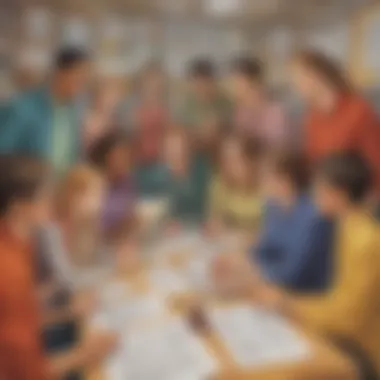

Responsibility becomes shared, and the collaborative drive boosts motivation. In such initiatives, students come together to witness the outcomes of their combined efforts, enriching both collective and individual learning experiences.
In summary, examples of effective group challenges, such as science experiments, art projects, and community service initiatives, provoke exploration, creativity, and cooperation among elementary students, ultimately paving the way for essential life skills.
Role of Educators in Group Challenges
Educators play a crucial role in facilitating the success of group challenges within the classroom. The correct approach from teachers can shape the experiences and outcomes of collaboration among students. When educators lead these initiatives effectively, it fosters not only teamwork but also promotes essential skills like innovation and critical thinking.
Guiding Students
One of the primary responsibilities of educators is to guide students throughout the group challenge process. It is vital for teachers to set the expectations clearly. When students know what they are working towards, they are more likely to engage meaningfully in group tasks.
Guidance can also include:
- Clarifying Roles: Assigning specific roles can help ensure participation among group members, making each student accountable in a way suited to their strengths.
- Encouraging Reflection: Educators can prompt students to reflect on group dynamics and their contributions. This encourages self-awareness and accountability, important traits in collaborative work.
- Providing Feedback: Through constructive feedback, teachers can help students navigate misunderstandings or conflicts, ensuring that learning continues without prolonged disruptions.
Providing Resources
For students to succeed in group challenges, access to appropriate resources is essential. Educators are responsible for providing tools that facilitate learning and enhance creativity among students. The resources may include:
- Educational Materials: Relevant books, articles, and online databases can offer insights and information that students can use to further their research and planning.
- Technology Tools: Access to platforms like Google Classroom can boost collaboration efforts. These tools allow students to communicate quickly and share documents seamlessly.
- Community Connections: Forming partnerships with local organizations for real-world challenges can provide additional context and resources, elevating the students' experiences while fostering a greater sense of community involvement.
Assessing Outcomes
Finally, assessing the outcomes of group challenges is another critical aspect of the educator's role. Proper assessment helps determine what students learned and the effectiveness of the collaboration. Assessments can be multifaceted. They might include:
- Peer Evaluations: Students can assess each other's contributions and collaboration efforts, which encourages honest feelings about teamwork.
- Reflective Journals: Having students keep journals during the group challenge fosters ongoing reflection and helps track their thought processes.
- Project Presentations: Presenting results allows groups to articulate their findings and process clearly, developing public speaking and presentation skills.
Educators must focus on understanding the learning that has taken place. Gathering this information not only informs adaptation for future challenges but also enriches the learning experience.
Effective educator involvement ensures a mentor-like guidance, resources, and assessment ways to better support students’ journeys through group challenges.
Through these components, the educator's action takes on layers of responsibility crucial in realizing the benefits of group challenges in education. Their engagement supports students in reaching their full potential.
Parental Involvement in Group Challenges
Parental involvement plays a significant role in the success of group challenges at school. Fostering collaboration among students benefits from the active engagement of parents, who can reinforce what is learned in the classroom. Involvement helps create a supportive atmosphere, ensuring that students feel encouraged and valued.
Supporting Classroom Activities
When parents support classroom activities, they provide a unified message about the importance of learning. Parents can become volunteers by assisting teachers in planning and facilitating group challenges. They also can attend group challenges, observe, and experience their child’s teamwork firsthand. This direct engagement gives parents valuable conversations to bridge school experiences and home life. For example, parents can:
- Attend special projects or presentations.
- Volunteer for events like science fairs, fostering excitement and interest.
- Collaborate with teachers to stay informed about group dynamics and activities.
Creating such relationships serves a dual purpose: it bolsters the child’s confidence and strengthens the community of educators and families.
Encouraging Practice at Home
Practicing at home extends the benefits of group challenges. By fostering an environment of collaborative learning, parents can reinforce their child’s skills and encourage critical thought. Therefore, age-appropriate, collaborative activities are beneficial. Parents can create opportunities like:
- Family game nights that require teamwork.
- Group tasks such as organizing events or completing household chores, fostering responsibility and cooperation.
- Discussing school projects, allowing children to express their thoughts, fostering both collaboration and critical thinking.
Encouragement during practice builds resilience and essential skills. Group challenges do not stop at the classroom door but extend into homsshe d law prostor hobbies, discussing topics of interest or solving problems together.
Parental engagement is pivotal to enhance children's educational outcomes.
Going beyond mere support, parents become an integral part of the educational process. Engaged parents contribute alongside teachers in fostering an environment conducive to learning, one that values collaboration and communication not only within school walls but also at home.
Future of Group Challenges in Education
The future of group challenges in education is not just a theoretical concept. It holds significance in shaping how students learn and interact with one another. This aspect of education goes beyond merely assigning tasks. It encourages collaboration, enhances critical thinking, and prepares young minds for challenges ahead. Educational practitioners must consider several elements to optimize group challenges for their students.
Evolving Educational Practices
One first important trend is the continuous evolution of educational practices. With research highlighting the benefits of collaborative learning, teachers are adjusting their methods to create environments that promote teamwork. Implementing group challenges gets students to communicate effectively, resolve conflicts, and share ideas creatively. Collectively working on projects leads to greater retention of knowledge and understanding. A hands-on approach ensures that students engaged are not passive participants but active learners.
Moreover, we must consider differentiated instruction. This recognizes that students learn at various paces and in different styles. Incorporating flexibility into group challenges can address diverse needs. A science experiment, for example, may allow for varied roles from leader to logistics organizer, meeting students at their individual levels. This adaptation nurtures not just academic skills but also emotional intelligence, which will be crucial as they grow.
Integration of Technology
Technology plays a critical role in shaping the future of group challenges in education. Innovating classroom practices through digital tools enhances collaboration and communication among students. Online platforms like Google Classroom or collaborative software, for instance, offer space for students to share resources and ideas conveniently. They can work together in real-time, even from different locations.
Additionally, game-based educational tools are gaining traction. They engage students in meaningful learning experiences while promoting teamwork. Incorporating these tools into group challenges can create exciting scenarios that provide immediate feedback and encourage friendly competition.
Ending: Emphasizing Collaboration
Collaboration is critical for success, especially within education. In the context of group challenges for elementary students, it promotes not only teamwork but also vital cognitive growth. This concluding section focuses on multiple aspects, benefits, and consideratioons surrounding the importance of collaboration in learning environments.
Recap of Key Insights
Throughout this article, we have discussed various perspectives on group challenges. Here are some essential insights:
- Definition and Purpose: Group challenges are designed to enhance collaboration and critical thinking among students. By working together, children learn to share ideas and solve problems collectively.
- Types of Challenges: Different forms, including creative, technology-based, and problem-solving challenges, can effectively engage students in varied ways.
- Benefits: Group challenges help enhance social skills, promote teamwork, and encourage risk-taking. These skills provide students with tools for further success in current and future endeavors.
- Implementation Strategies: Instructors can improve group dynamics through clear objectives and diverse teams. Evaluting performance festivals further enables effective learning outcomes.
- Role of Parents and Educators: Classroom activities become more profound with parental involvement. Edcarators should guide, support, and assess students as they partake in such challenges.







